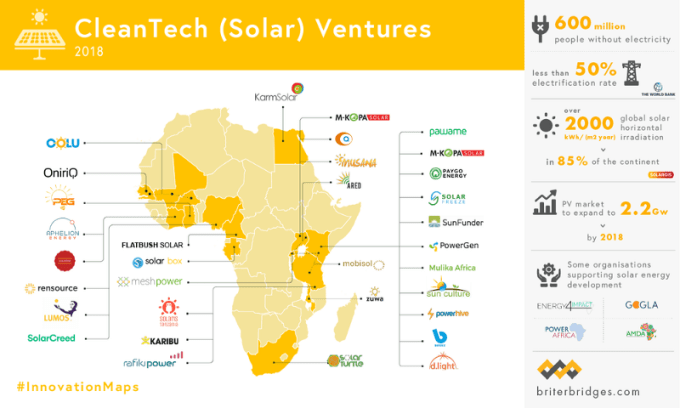Nigerian Solar Energy Company Lumos Raises $35 million To Expand Its Existing Market
Lumos is leading Africa’s solar energy investments. Barely 7 years old, the company which is a solar home system provider, has announced new financing from U.S. International Development Finance Corporation (DFC) to expand its existing market for reliable, accessible and clean solar power in Nigeria.

“This funding from DFC will enable people throughout Nigeria to seize the opportunities that come with access to reliable and affordable power. Access to energy is the foundation for a high quality of life, good healthcare, education and increased income. Our ultimate goal at Lumos is to provide power for everyone,” Alistair Gordon, Group CEO, Lumos, said.
Here Is What You Need To Know
- Armed with the new financing, Lumos will produce an additional 160,000 solar home systems (SHS) to meet ever-increasing demand from homes and businesses across the country where it already has a majority of the market share.
- The DFC financing announcement follows funding from Dutch entrepreneurial development bank FMO, announced in August, that will more than double Lumos’ customer base in Côte d’Ivoire, solidifying its position as the solar home system market leader in West Africa.
- Lumos secured $90 million in fundraising, the Nigeria’s largest ever investment in the power industry in 2016. The investment included $50 million of debt funding from Overseas Private Investment Corporation (“OPIC”), the U.S. Government’s development finance institution and a total of $40 million of equity. The equity was raised from a consortium led by Pembani Remgro Infrastructure Fund (“PRIF”), the African infrastructure investor, and existing investors VLTCM and ICV.
Why The Investor Invested
DFC has previously invested in Lumos in 2016, and so its latest investment is an indication that the company is gaining momentum. Again, the investment is going into a sector with huge potential, and ability to generate profitable returns. Currently, more than 160 million people in Nigeria have poor or no access to the electricity grid.
“Access to power is a fundamental need across Africa and is even more urgent as COVID-19 continues to impact communities across the continent. Supporting Lumos will empower one million people across Nigeria by delivering access to reliable and affordable energy. Together, we can help unlock Africa’s enormous potential for growth,” Worku Gachou, Managing Director for Africa, at DFC said.
According to Shmulik Kollender, Group COO & CFO Lumos, the company’s longstanding partnership with DFC had already allowed it to command a market leading position in the largest off-grid market in Sub-Saharan Africa.
“DFC financing is even more important these days,” he said. “In light of the impact that COVID-19 has on our customers there is a real need for impact-oriented investors that can share our vision to eliminate energy-poverty in the country.”

Read also: How Startups In Nigeria Are Disrupting Nigeria’s Electricity Problems
A Look At What Lumos Does
Launched in Nigeria in 2013, Lumos enables people to replace hazardous and expensive kerosene generators and lanterns with modern solar electricity that can power lights, cellphones, fans, computers, TVs and other compatible small electronic devices. By offering Solar Power as a Service, Lumos offers homes and small businesses a simple and affordable way to pay for electricity in small installments using their mobile phones. Lumos targets off-grid residential and small businesses. Lumos reached its 500 system goal for the pilot in May 2015 and sold over 3,000 solar home systems in 2015.
‘‘The process your company goes through as it graduates from a start-up to a fully-fledged business is a much bigger challenge than I had anticipated,’’ Jumo co-founder and President Nir Marom said. ‘‘There is a very difficult skill set between getting a project and company off the ground — making an idea a reality — to running a growing business. It has many different demands, requires different skills and a very different management style.’’
Ultimately though, the biggest challenge I face is also why I started this company in the first place: how do you bring power to 1.3 billion of the world’s poorest people who don’t have access to electricity?
People left behind by the conventional grid tend to be tricky for businesses to reach, to communicate with, and to service.
We overcame this by partnering with other organisations, leveraging their strengths in respective areas. We know that MTN have better billing, payment and sales systems in Nigeria than we do — and they know that we make better solar systems. This is the future of business and its working for us right now. We just celebrated reaching our 200,000th customer in Nigeria.
In partnership with MTN, Nigeria’s leading mobile phone operator, Lumos Global today allows its customers to pay for the system as they go, obtaining electricity for less than 50 US cents a day, using mobile phone credit.
‘‘Our partnership with the biggest mobile provider in the Africa, MTN, might have seemed risky for a start-up, but it has made us what we are today. Partnerships are a key component of our expansion model,’’ Nir Marom said.
Solar home systems offer a rapidly deployable power solution to a global market of more than two billion people. Currently, there are 740 million people with poor or no access to the electricity grid in Sub-Saharan Africa.
Charles Rapulu Udoh

Charles Rapulu Udoh is a Lagos-based lawyer who has advised startups across Africa on issues such as startup funding (Venture Capital, Debt financing, private equity, angel investing etc), taxation, strategies, etc. He also has special focus on the protection of business or brands’ intellectual property rights ( such as trademark, patent or design) across Africa and other foreign jurisdictions.
He is well versed on issues of ESG (sustainability), media and entertainment law, corporate finance and governance.
He is also an award-winning writer

